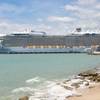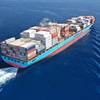Great Lakes Dredge and Dock Company of Oak Brook, Ill., will pay nearly $1 million for damages to seagrass and other resources in the Florida Keys National Marine Sanctuary, the Justice Department and the Commerce Department's National Oceanic and Atmospheric Administration (NOAA) announced. The $969,000 settlement reached on behalf of NOAA and the State of Florida is the largest ever obtained for damages to seagrass in the sanctuary. The funds, combined with an earlier $618,485 settlement obtained from co-defendant Coastal Marine Towing, will help restore the injured areas and reimburse NOAA for response costs. "We are thrilled with the settlement," said Sharon Shutler, attorney for the NOAA General Counsel for Natural Resources. "We wanted to restore this site in 1993 when the groundings occurred. Now we finally have the means to restore these important Sanctuary resources."
In May 1993, four tug boats owned by the two companies were transporting heavy dredging equipment and dredge pipes from the Boca Grande Channel off Florida's west coast to Green Cove Spring on the east coast. Before the flotilla reached Seven Mile Bridge off Marathon, Florida, one or more of the dredge pipes being towed by one of the tugs came loose and dragged across the bottom of Florida Bay, causing a scar 13 miles long and destroying 196,764 square feet of seagrass and other sanctuary resources. The dragging pipe caused the tug to slow and another tug attempted to pass her. The other vessel ran hard aground, creating a massive hole and destroying 80,675 square feet of seagrass and coral, about one and a half times the size of a football field, at an area called Red Bay Banks off Marathon.
While the coral reefs are the sanctuary's most famous resource, seagrass meadows and other habitats, such as the mixed seagrass and finger coral bottom at Red Bay Banks, are critical to fish and other marine life populations. Seagrass also filters and stabilizes sediments, helping to create clear waters.
Subscribe for
Maritime Reporter E-News
Maritime Reporter E-News is the maritime industry's largest circulation and most authoritative ENews Service, delivered to your Email five times per week










